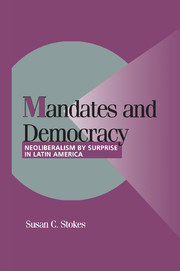Book contents
- Frontmatter
- Contents
- Preface
- 1 ELECTIONS, MANDATES, AND REPRESENTATION
- 2 ELECTIONS AND ECONOMIC POLICY IN LATIN AMERICA
- 3 EXPLAINING POLICY SWITCHES
- 4 ARE PARTIES WHAT'S WRONG WITH DEMOCRACY IN LATIN AMERICA?
- 5 NEOLIBERALISM WITHOUT MANDATES: CITIZENS RESPOND
- 6 MANDATES AND DEMOCRATIC THEORY
- 7 SUMMARY, PREDICTIONS, UNSETTLED QUESTIONS
- References
- Author Index
- Subject Index
- Titles in the series
7 - SUMMARY, PREDICTIONS, UNSETTLED QUESTIONS
Published online by Cambridge University Press: 10 December 2009
- Frontmatter
- Contents
- Preface
- 1 ELECTIONS, MANDATES, AND REPRESENTATION
- 2 ELECTIONS AND ECONOMIC POLICY IN LATIN AMERICA
- 3 EXPLAINING POLICY SWITCHES
- 4 ARE PARTIES WHAT'S WRONG WITH DEMOCRACY IN LATIN AMERICA?
- 5 NEOLIBERALISM WITHOUT MANDATES: CITIZENS RESPOND
- 6 MANDATES AND DEMOCRATIC THEORY
- 7 SUMMARY, PREDICTIONS, UNSETTLED QUESTIONS
- References
- Author Index
- Subject Index
- Titles in the series
Summary
A general characteristic of democracy is that, before elections, candidates and parties reveal their intentions regarding what policies they will pursue if they win. Since the mid-eighteenth century, they have used campaign manifestos as the vehicle for this self-revelation, as well as speeches, ads, debates, and so on, to create expectations about what their government would do and how this contrasts with what their competitors would do. Because campaign pronouncements generally serve as a blueprint for a government's actions in office, voters have a meaningful choice about the future course of public policy. Over the course of a term conditions change, and the blueprint will have to be revised or scrapped. But if campaign pronouncements reveal intentions, then, at least early in the government's term, policies will match campaign announcements.
Yet this general characteristic does not always hold. An American candidate promises “no new taxes” and then raises them. A German party promises higher old-age pensions but then leaves them unchanged. A New Zealand party manifesto promises support for state programs and then begins to cut them. A British party opposes protections for Catholics, but their new prime minister then proposes a bill to protect them. Another British party, two and a half centuries later, pledges in its campaign to protect scholarships for private-school students and then eliminates them. And a wave of Latin American candidates promise to buck pressures to liberalize their economies and then liberalize.
- Type
- Chapter
- Information
- Mandates and DemocracyNeoliberalism by Surprise in Latin America, pp. 185 - 196Publisher: Cambridge University PressPrint publication year: 2001

